The Intel Core i9-9980XE CPU Review: Refresh Until it Hertz
by Ian Cutress on November 13, 2018 9:00 AM ESTHEDT Performance: Web and Legacy Tests
While more the focus of low-end and small form factor systems, web-based benchmarks are notoriously difficult to standardize. Modern web browsers are frequently updated, with no recourse to disable those updates, and as such there is difficulty in keeping a common platform. The fast paced nature of browser development means that version numbers (and performance) can change from week to week. Despite this, web tests are often a good measure of user experience: a lot of what most office work is today revolves around web applications, particularly email and office apps, but also interfaces and development environments. Our web tests include some of the industry standard tests, as well as a few popular but older tests.
We have also included our legacy benchmarks in this section, representing a stack of older code for popular benchmarks.
All of our benchmark results can also be found in our benchmark engine, Bench.
WebXPRT 3: Modern Real-World Web Tasks, including AI
The company behind the XPRT test suites, Principled Technologies, has recently released the latest web-test, and rather than attach a year to the name have just called it ‘3’. This latest test (as we started the suite) has built upon and developed the ethos of previous tests: user interaction, office compute, graph generation, list sorting, HTML5, image manipulation, and even goes as far as some AI testing.
For our benchmark, we run the standard test which goes through the benchmark list seven times and provides a final result. We run this standard test four times, and take an average.
Users can access the WebXPRT test at http://principledtechnologies.com/benchmarkxprt/webxprt/
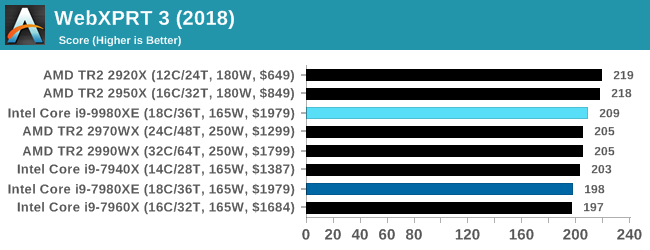
WebXPRT 2015: HTML5 and Javascript Web UX Testing
The older version of WebXPRT is the 2015 edition, which focuses on a slightly different set of web technologies and frameworks that are in use today. This is still a relevant test, especially for users interacting with not-the-latest web applications in the market, of which there are a lot. Web framework development is often very quick but with high turnover, meaning that frameworks are quickly developed, built-upon, used, and then developers move on to the next, and adjusting an application to a new framework is a difficult arduous task, especially with rapid development cycles. This leaves a lot of applications as ‘fixed-in-time’, and relevant to user experience for many years.
Similar to WebXPRT3, the main benchmark is a sectional run repeated seven times, with a final score. We repeat the whole thing four times, and average those final scores.
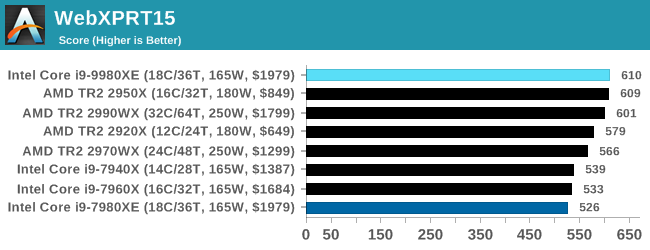
Speedometer 2: JavaScript Frameworks
Our newest web test is Speedometer 2, which is a accrued test over a series of javascript frameworks to do three simple things: built a list, enable each item in the list, and remove the list. All the frameworks implement the same visual cues, but obviously apply them from different coding angles.
Our test goes through the list of frameworks, and produces a final score indicative of ‘rpm’, one of the benchmarks internal metrics. We report this final score.
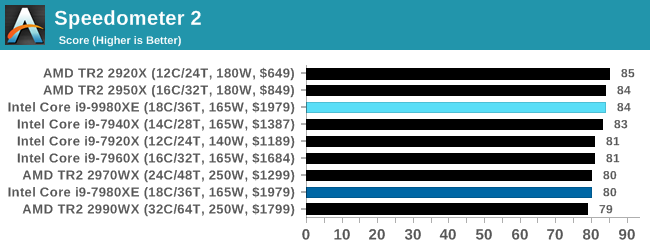
Google Octane 2.0: Core Web Compute
A popular web test for several years, but now no longer being updated, is Octane, developed by Google. Version 2.0 of the test performs the best part of two-dozen compute related tasks, such as regular expressions, cryptography, ray tracing, emulation, and Navier-Stokes physics calculations.
The test gives each sub-test a score and produces a geometric mean of the set as a final result. We run the full benchmark four times, and average the final results.
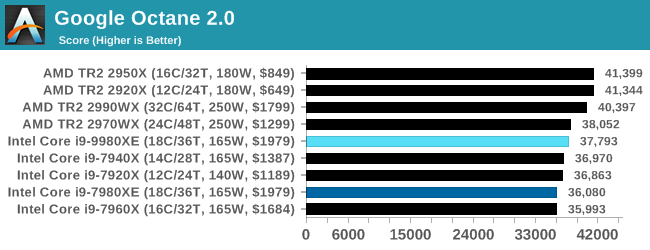
Mozilla Kraken 1.1: Core Web Compute
Even older than Octane is Kraken, this time developed by Mozilla. This is an older test that does similar computational mechanics, such as audio processing or image filtering. Kraken seems to produce a highly variable result depending on the browser version, as it is a test that is keenly optimized for.
The main benchmark runs through each of the sub-tests ten times and produces an average time to completion for each loop, given in milliseconds. We run the full benchmark four times and take an average of the time taken.
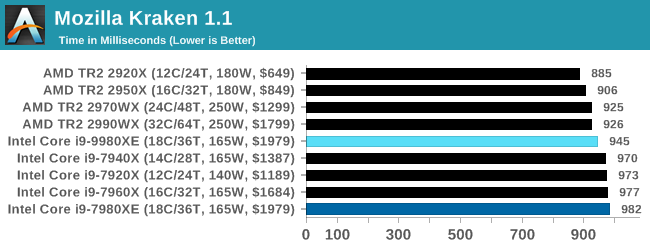
3DPM v1: Naïve Code Variant of 3DPM v2.1
The first legacy test in the suite is the first version of our 3DPM benchmark. This is the ultimate naïve version of the code, as if it was written by scientist with no knowledge of how computer hardware, compilers, or optimization works (which in fact, it was at the start). This represents a large body of scientific simulation out in the wild, where getting the answer is more important than it being fast (getting a result in 4 days is acceptable if it’s correct, rather than sending someone away for a year to learn to code and getting the result in 5 minutes).
In this version, the only real optimization was in the compiler flags (-O2, -fp:fast), compiling it in release mode, and enabling OpenMP in the main compute loops. The loops were not configured for function size, and one of the key slowdowns is false sharing in the cache. It also has long dependency chains based on the random number generation, which leads to relatively poor performance on specific compute microarchitectures.
3DPM v1 can be downloaded with our 3DPM v2 code here: 3DPMv2.1.rar (13.0 MB)
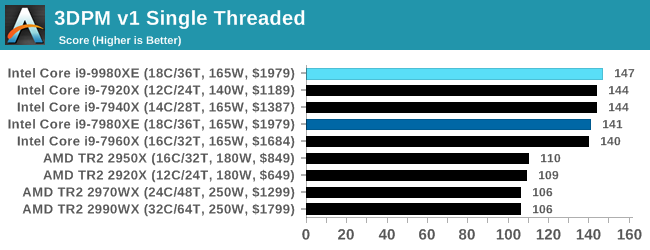
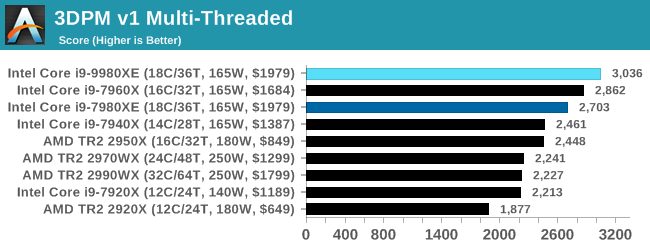
x264 HD 3.0: Older Transcode Test
This transcoding test is super old, and was used by Anand back in the day of Pentium 4 and Athlon II processors. Here a standardized 720p video is transcoded with a two-pass conversion, with the benchmark showing the frames-per-second of each pass. This benchmark is single-threaded, and between some micro-architectures we seem to actually hit an instructions-per-clock wall.
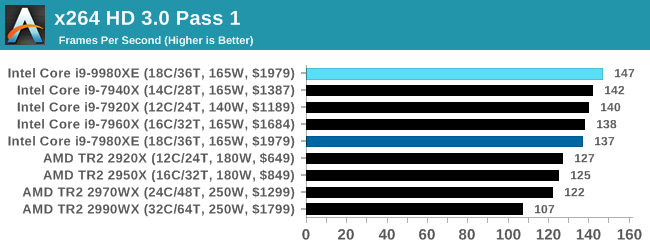
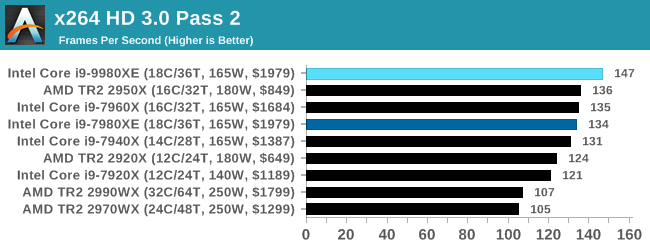










143 Comments
View All Comments
jospoortvliet - Thursday, November 15, 2018 - link
If you are so immature and clueless as to not recognize that most professionals - like anyone in sales or management or 90% of other professions have no need for more compute than a 15 watt core i5 delivers you should certainly not call others unprofessional.bigboss2077 - Saturday, November 24, 2018 - link
ohh man I think you take too much weed.PeachNCream - Tuesday, November 13, 2018 - link
It's about bragging or walking around with a puffed up chest. For some people, self-promotion through the ownership of overpriced, unnecessary computer hardware is an important element of filling up otherwise empty, meaningless lives.Spunjji - Tuesday, November 13, 2018 - link
It's weird, because you're doing that too, only inverted. Your entire argument seems to be that because it's good enough for you and your colleagues it should be good enough or everyone.PeachNCream - Tuesday, November 13, 2018 - link
Attack as a means of defense. You're implying I've listed a set of specifications that meet everyone's requirements in order to attempt to defeat an argument that contained no such implication because you can't find another way to discredit it.MisterAnon - Wednesday, November 14, 2018 - link
You look ridiculous trying to get out of admitting that you lost the argument. Interesting mental gymnastics though.MisterAnon - Wednesday, November 14, 2018 - link
>It's about bragging or walking around with a puffed up chest.That's funny, because it seems the only one doing that is you! I sense an insecurity coming from you over the fact that you use a tiny laptop. Unless your job requires you to walk around and type at the same time, there is precisely zero reason for any professional to sacrifice power and productivity for useless mobility. You're going to be in the same room all day at work.
PeachNCream - Wednesday, November 14, 2018 - link
Setting conditions for what justifies or doesn't justify a mobile computer versus a desktop is just an attempt to create "rules" for the silly Calvinball-style game you're attempting to play. "Oh, you can ONLY use X if condition Y exists, so nyah nyah! I win you big meanie!" I know that typing when you're offended tends to limit the ability to think sensibly, but at least pause for a moment or two before you let your emotions get the better of you.imaheadcase - Tuesday, November 13, 2018 - link
"intel tax" as in if you didn't want to upgrade you have to scrap motherboard/ram to upgrade anyways if already intel? Tell me more about that tax they charge.That is a silly expression, much like people saying "Gsync tax". Not even a tax in that case, you literally are going to buy a monitor with it if you have nvidia..you would actually pay MORE to buy a new gpu/monitor together for other option. lol
Spunjji - Tuesday, November 13, 2018 - link
Your post engages in little more than sophistry. It's equivalent to claiming that house prices in London aren't any higher than they are in Sheffield because you, the buyer, already live in London. You might want to live there for various reasons, but you're still paying more money for something directly comparable because of that choice. Whether you think it's worth it is up to you, but to pretend it doesn't exist is just weird.